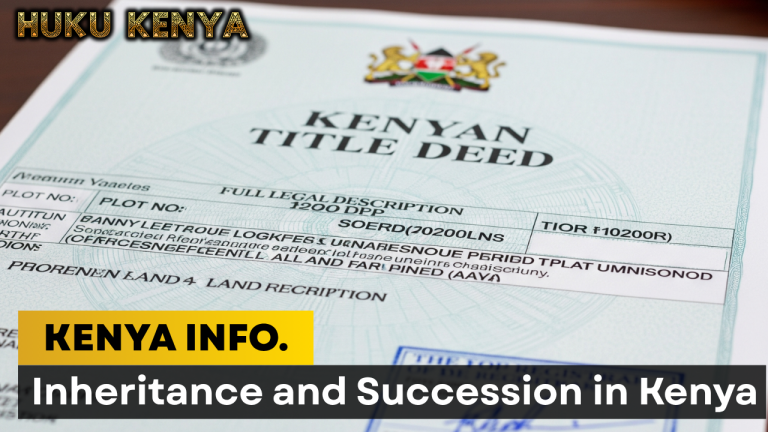
From succession to sale: your complete roadmap to a clean, legal land transaction
Inheriting land in Kenya is one thing—selling it legally is another. Many heirs assume that once a loved one passes, they can immediately sell the land. But under Kenyan law, you cannot sell inherited land until it’s legally transferred to your name through a court-confirmed succession process.
Here’s how to do it right—step by step.
1. Confirm the Succession Process Is Complete
Before you can sell, you must have:
- A Confirmed Grant of Letters of Administration (or Probate if there was a will)
- A Certificate of Confirmation of Grant showing the land is allocated to you
- The land transferred into your name via the Ministry of Lands
If the land is still in the deceased’s name, you can’t sell it—period.
2. Apply for Transmission of Title
This is the legal process of moving the land from the deceased’s name to yours.
What you’ll need:
- Confirmed Grant (certified copy)
- Original title deed
- Death certificate
- Land rent and rate clearance certificates
- KRA PINs of all beneficiaries
- Duly filled transmission forms (available on Ardhisasa or at the Lands Registry)
Once approved, the Ministry of Lands will issue a new title deed in your name.
3. Conduct a Land Search
Before listing the land for sale:
- Do an official land search via Ardhisasa or the local Lands Registry
- Confirm:
- You are the registered owner
- There are no encumbrances (e.g. caveats, loans, disputes)
- The land is not under compulsory acquisition or succession objection
4. Clear All Outstanding Land Dues
You must settle:
- Land rates (County Government)
- Land rent (Ministry of Lands, for leasehold land)
- Any penalties or arrears
Obtain clearance certificates—they’re mandatory for transfer.
5. Hire a Lawyer and Draft a Sale Agreement
A licensed advocate will:
- Draft a binding sale agreement
- Conduct due diligence on the buyer
- Ensure compliance with the Law Society of Kenya (LSK) Conveyancing Rules
The agreement should include:
- Purchase price and payment terms
- Parcel number and size
- Possession date
- Dispute resolution clause
- Signatures of both parties and witnesses
6. Apply for Land Control Board (LCB) Consent
Required if:
- The land is agricultural
- Located outside municipalities
- Being sold to a non-family member
Apply at the local LCB office. Without consent, the sale is null and void under the Land Control Act (Cap 302).
7. Pay Capital Gains Tax (CGT)
As the seller, you must:
- File a CGT return on iTax
- Pay 15% of the net gain (sale price minus acquisition and improvement costs)
- Obtain a CGT clearance certificate
Note: Inherited land is considered acquired at the date of death, not the original purchase date.
8. Buyer Pays Stamp Duty
The buyer must:
- Obtain a valuation from the Ministry of Lands
- Pay stamp duty:
- 4% for urban land
- 2% for rural/agricultural land
- Get a payment receipt for registration
9. Lodge Transfer Documents at the Lands Registry
Submit:
- Original title deed
- Signed transfer forms (Form LTR1)
- Sale agreement
- LCB consent (if applicable)
- CGT and stamp duty receipts
- KRA PINs and ID copies
- Clearance certificates (rates and rent)
The registry will process and issue a new title deed in the buyer’s name.
10. Final Handover
Once the new title is issued:
- Hand over physical possession of the land
- Provide the buyer with:
- Original sale agreement
- Clearance certificates
- Mutation forms (if subdivided)
- Any survey maps or beacons
Common Mistakes to Avoid
- Selling before succession is complete
- Skipping LCB consent (where required)
- Failing to pay CGT or obtain clearance
- Using unlicensed brokers or lawyers
- Ignoring family objections or pending disputes
Final Word: Inherited Land Is Not Automatically Yours to Sell
Selling inherited land in Kenya is perfectly legal—but only after you’ve followed the full succession and transfer process. Skipping steps can lead to fraud claims, title cancellation, or even arrest.

























